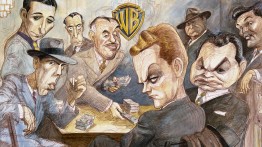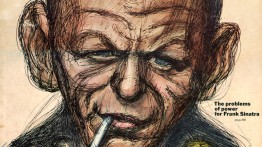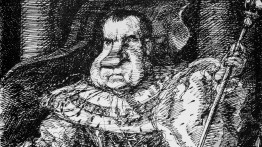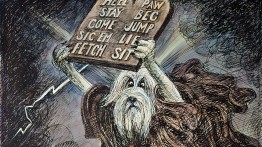COOPERMADE: Ed Sorel, A Memoir
In a 1993 interview, renowned illustrator, cartoonist, and writer Edward Sorel A'51 told The Comics Journal: “God did not put me on this earth to make people happy, he put me on earth to be a commercial hack. And that’s what I was for the first 20 years in the field.”
With the publication of his new book, Profusely Illustrated: A Memoir, readers will have a chance to judge for themselves whether or not his early years were quite so bleak—first as a hapless paste-up man at ad agencies and magazines; then, in 1953, as co-founder of the groundbreaking graphic design firm Push Pin Studios. And finally as a singular talent who marshalled his cynicism, humility, and wit to fashion a style of illustration immediately recognizable to anyone who’s read a magazine during the past 60 years.
Sorel, who grew up in the Bronx, attended The Cooper Union after graduating from the High School of Music and Art. In Profusely Illustrated, he credits both schools with destroying his nascent drawing skills since abstraction was the style of the day. Nonetheless his days at Cooper put him in good stead for the Push Pin collaboration—first with Seymour Chwast A'51, and soon afterwards with Reynold Ruffins A'51 and Milton Glaser A'51, all his fellow Cooper students.
Initially the firm’s salesman, Sorel toted the group’s portfolio to the offices of New York’s art directors and almost immediately started getting work. It was a job for Pepperidge Farm—a filmstrip about the history of bread baking—that got Sorel drawing again after learning a technique called slip-sheeting from Glaser and Chwast, a method that let him make work with greater ease and pliancy and not worry so much about making mistakes. It’s a lesson that still underpins his working method: “I think the important thing is to work in such a way that accidents can happen,” he said in the 1993 interview.
His drawing mojo restored, he soon began freelancing as an illustrator, eventually selling work to Ramparts and Monocle, among others, while developing a style notable for its hatched shading and faces that seem to be reflected in a convex lens—all eyes and noses. Over the years, his work has been in Time, Harper’s, and Esquire, among others, and he’s been a regular contributor to The Nation and The Atlantic, magazines where he honed his reputation as a gutsy satirist who had no problems skewering any person or institution he deemed pompous, drunk on power, hypocritical, or any combination of the three. He’s come out with Profusely Illustrated, he writes in the introduction, for two reasons: first, to preserve some of his own work, which was almost completely made for periodicals, media designed to be short-lived. And second, to explain how Donald Trump was elected president as a result of the 12 presidencies that preceded his. The narrative contextualizes Sorel’s career in light of the era’s politics—most especially the wars in Korea and Vietnam, the Nixon administration, and its disastrous end with Watergate. The period gave him enormous fodder for his rage—and his cartoons. There were drawings of pro-war clergy—Cardinal Spellman running into battle with an unsheathed bayonet in Sorel’s “Pass the Lord and Praise the Ammunition”—and any number of political caricatures, including a succinct summary of the Nixon presidency: Tricky Dick as the Sun King. (In 2003, he let his subjects get their revenge: for “Edward Sorel and the Presidents,” he depicted himself as a nude model posing for the likes of Nixon, Reagan, and Carter all mercilessly sketching the artist.)
In the 1990s, he made memorable covers for The New Yorker, including a glaring Whistler’s Mother waiting for her son to call and his 1997 diptych of Frank Sinatra, the young bow-tied crooner face-to-face with the tumescent grandee of the singer’s final years—both astonished by the other. In a way, it was as much about the long span of Sorel’s career as Sinatra’s: in 1966, he had famously drawn the cover for Esquire to accompany Gay Talese’s celebrated profile of the singer, “Frank Sinatra Has a Cold.”
Besides political satire, Sorel has dedicated some of his work to drawings of the great movie stars of the 1930s and ‘40s like James Cagney and Humphrey Bogart. But in 2016, he published a book about a lesser-known star entitled Mary Astor’s Purple Diary: The Great American Sex Scandal of 1936. It had been a project long in the making, and a challenging one, written and drawn soon after the death of his wife and some-time collaborator, Nancy Caldwell Sorel. Despite being widely celebrated as a sharp observer of political hypocrisy—he has been awarded The George Polk Award for Satiric Drawing and was one of the few cartoonists elected to the Art Directors Club of New York’s Hall of Fame—Sorel made drawings that exude an empathy for the maligned actress as well as the art of moviemaking long ago. The paean to Astor and her era seems fitting for an artist who has resisted newer technologies for drawing. As he put it in Profusely Illustrated, “I’m too much in love with making images by hand to want to discover what magic I could do on the computer.”
To purchase Profusely Illustrated: A Memoir, click here.









